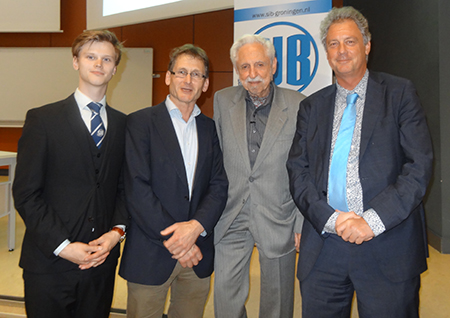Prof.dr. Carl Djerassi, vader van de orale anticonceptie, bezoekt Rijksuniversiteit Groningen
Prof.dr. Carl Djerassi, emiritus hoogleraar Scheikunde aan Stanford University, brengt vandaag een bezoek aan de Rijksuniversiteit Groningen en het UMCG. Djerassi verwierf mondiale bekenheid als uitvinder van de orale anticonceptiepil. Djerassi en zijn onderzoeksteam hebben als eerste de werkzame stof in de pil gekarakteriseerd en gesynthetiseerd.

Als auteur van meer dan 1200 wetenschappelijke artikelen en zeven monografieën, is Djerassi één van de twee Amerikaanse scheikundigen die zowel de National Medal of Science (in 1972, voor de eerste synthese van steroïde orale anticonceptie) als de National Medal of Technology (in 1991, voor het promoten van nieuwe benaderingen voor insectenbestrijding) heeft ontvangen. Djarassi zal tijdens zijn bezoek aan de RUG worden ontvangen door chemicus prof.dr. Ben Feringa.
Openbare lezing
Djerassi verzorgt vanavond een lezing over de ‘Divorce of Sex from Reproduction: A Shift in Gender-Power Relations’. De avond wordt georganiseerd door de studentenvereniging SIB Groningen, in samenwerking met de studieverenigingen Panacea, Pharmaciae Sacrum en IFMSA. De toegang is gratis en de avond is voor iedereen toegankelijk. Locatie: Keuningzaal in het UMCG.
Meer nieuws
-
26 februari 2026
Vici-beurs voor hoogleraar Neurologie Marieke Wermer
-
17 februari 2026
Van ghostbuster tot rampenonderzoeker
-
17 februari 2026
De lange zoektocht naar nieuwe fysica
